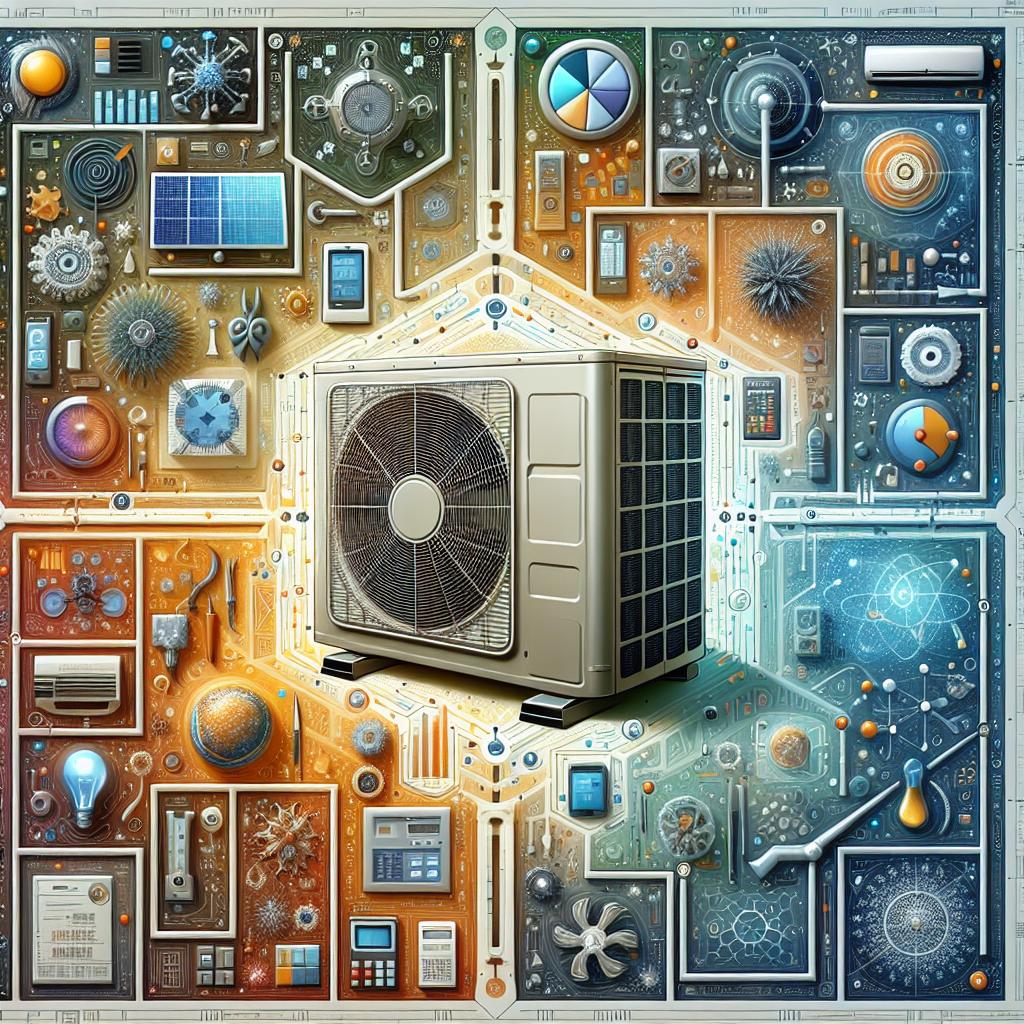When teh air inside your home becomes stagnant and uncomfortable, the silent workhorse tucked away in your basement or attic often takes the blame: your HVAC unit. It’s the unsung hero of our everyday comfort, regulating temperatures and quality of air, yet it rarely gets the attention it deserves—until it starts showing signs of age. As homeowners, the decision to replace this crucial equipment can spark a whirlwind of questions: How long should an HVAC system last? What is the true cost of a new unit? And perhaps most importantly, when is it time to say goodbye to the old and invest in the new? In this article, we’ll explore the various factors that influence the cost of replacing your HVAC system, breaking down not only the price tag but also the value of comfort, efficiency, and peace of mind. Whether your unit is nearing its end or you simply want to be informed for future decisions, understanding the costs involved will empower you to make the best choice for your home and family.
Understanding the Lifespan of HVAC Units and When Replacement is Necessary
The lifespan of an HVAC unit can vary significantly depending on several factors, including the type of system, frequency of maintenance, and environmental conditions. Generally, most HVAC systems last between 15 to 20 years. During this period, consistent maintenance is crucial. Regular check-ups and tune-ups can not only extend the lifespan of your unit but also enhance its efficiency and reduce energy costs.When considering a replacement, it’s essential to assess whether the unit is still meeting your heating and cooling needs effectively.
Several indicators may signal that it’s time to consider a replacement. Here are some key factors that can help you make this determination:
- Age of the Unit: If your HVAC system is over 15 years old, it may be time to think about a new one.
- rising Energy Bills: Increased energy costs despite regular maintenance may indicate that your unit is becoming less efficient.
- Frequent Repairs: If you find yourself making costly repairs multiple times a year, investing in a new system might save you money in the long run.
Additionally, homeowners should consider the seasonal energy efficiency ratio (SEER) and heating seasonal performance factor (HSPF) ratings of newer models, as advancements in technology could offer substantial savings and improved comfort. Here’s a simple comparison:
| HVAC Type | Average Lifespan | Estimated Replacement Cost |
|---|---|---|
| Central AC | 15-20 years | $3,000 - $7,000 |
| Furnace | 20-30 years | $2,500 – $6,000 |
| Heat Pump | 10-15 years | $4,000 – $8,000 |

Factors Influencing the Cost of HVAC Unit Replacement
When considering the cost of replacing an HVAC unit, several critical factors come into play. First and foremost, the size and capacity of the system required for your space can greatly influence the overall price. Larger units that can effectively heat or cool bigger areas will naturally cost more than smaller ones. additionally, the efficiency rating of the HVAC system also impacts the price; higher SEER (Seasonal Energy Efficiency Ratio) ratings, though pricier upfront, can save homeowners substantial amounts on energy bills in the long run.Key considerations include:
- System size and capacity needed
- Efficiency ratings (SEER and AFUE)
- Brand reputation and warranty offerings
Another crucial aspect is the complexity of the installation process. If your home requires extensive ductwork modifications or electrical upgrades, this can significantly escalate the costs. Geographic location also plays a role; labor rates and availability of HVAC professionals vary from region to region. Other factors to weigh are:
- Additional installation requirements
- Local market conditions and labor costs
- Seasonal demand and urgency of replacement

Exploring Energy Efficiency Ratings and Long-Term Savings
Energy efficiency ratings are pivotal metrics that can significantly influence your choice when replacing an HVAC unit. these ratings, often represented by the SEER (Seasonal Energy Efficiency Ratio) for cooling and AFUE (Annual Fuel Utilization Efficiency) for heating, serve as benchmarks to compare the efficiency of different models. When evaluating a unit, consider opting for those with higher ratings; they might require a larger initial investment but will deliver substantial savings over time through lower energy bills. as an example, a unit with a SEER of 14 can save you an average of $300 to $500 per year compared to an older unit with a SEER of 8. This not only reduces your monthly expenses but also diminishes your environmental footprint.
To illustrate the long-term benefits more clearly, the following table summarizes potential cost savings based on different energy efficiency ratings over a typical lifespan of 15 years. Investing in a more efficient HVAC unit can be financially rewarding, and understanding these ratings can assist in making a well-informed decision.
| SEER Rating | Average yearly Savings | Total savings Over 15 Years |
|---|---|---|
| 8 | $0 | $0 |
| 12 | $200 | $3,000 |
| 14 | $350 | $5,250 |
| 16 | $500 | $7,500 |

Choosing the Right HVAC unit for Your Home and Budget
When it comes to selecting the ideal HVAC unit for your home, several factors must be taken into account to ensure optimal comfort and efficiency. Start by assessing your home’s square footage, as this will determine the size of the unit you need. A unit that is too small will struggle to cool or heat your space, while an oversized unit can lead to higher energy bills and insufficient humidity control. Other crucial considerations include:
- Energy Efficiency Ratings: Look for units with high SEER (Seasonal Energy Efficiency Ratio) ratings, as they consume less energy, saving you money on utility bills.
- Fuel Source: Decide between electric, gas, or geothermal options based on availability and long-term cost considerations.
- Features: Consider modern features such as programmable thermostats,smart home integration,and variable-speed fans that enhance comfort and efficiency.
Your budget will also play a meaningful role in determining the right HVAC unit.It’s essential to strike a balance between initial investment and long-term operational costs. While high-efficiency models may carry a higher price tag upfront, their reduced energy consumption can translate into substantial savings over time. Below is a simple comparison of average costs associated with different HVAC unit types:
| HVAC Type | Average Cost (Unit Only) | Annual Energy cost |
|---|---|---|
| Central AC | $3,000 – $7,000 | $500 – $1,200 |
| Heat Pump | $3,500 – $8,000 | $400 - $1,000 |
| Gas Furnace | $2,500 – $6,000 | $800 - $1,500 |
Q&A
Q&A: How Much to Replace Your HVAC Unit?
Q1: What factors influence the cost of replacing an HVAC unit?
A: Several factors come into play when determining the cost of replacing your HVAC unit. These include the size and type of the unit needed, the complexity of the installation, any necessary ductwork modifications, and regional labor costs. Additionally, the energy efficiency rating (SEER) of the new unit can also impact the overall price, as higher efficiency models typically come with a higher upfront cost but promise savings on energy bills in the long run.
Q2: How do I know if I need to replace my HVAC unit?
A: If your HVAC unit is over 10-15 years old, requires frequent repairs, or is making strange noises, it might potentially be time to consider a replacement. Furthermore, if you’re experiencing inconsistent temperatures or high utility bills, these could be signs of inefficiency warranting a new unit. Consulting with an HVAC professional can provide clarity on whether repair or replacement is the best route for you.
Q3: What is the average cost of an HVAC replacement?
A: On average, homeowners can expect to pay between $3,000 and $7,500 for a complete HVAC replacement. This price range varies widely based on factors such as the type of unit (central air,heat pump,etc.),brand,and installation specifics. For instance, ductless mini-split systems may cost differently due to their unique installation processes.
Q4: Are there financing options available for HVAC replacement?
A: Yes, many HVAC companies offer financing plans to help ease the financial burden of replacing an HVAC unit. additionally, some municipalities and utility companies provide rebates or incentives for upgrading to energy-efficient systems, which can further offset costs. Be sure to inquire about all available options and read the fine print.
Q5: How can I ensure that I’m getting a fair estimate for my HVAC replacement?
A: To ensure a fair estimate, it’s recommended to obtain quotes from at least three different HVAC contractors. Look for licensed professionals with good reviews and experience in your local area. Be wary of unusually low estimates, as these may indicate subpar equipment or installation practices. A extensive quote should include equipment costs, labor, and any additional materials needed for the installation.
Q6: Should I do any readiness before the installation of a new HVAC unit?
A: Yes, preparation can help streamline the process. Clear the area around your current HVAC unit to provide easy access for the installers. If possible, discuss any specific preferences or requirements you may have regarding the new unit’s placement or features. Additionally, consider discussing your home’s insulation and ventilation with the contractor, as this can influence the effectiveness of your new system.
Q7: How long can I expect a new HVAC unit to last?
A: The lifespan of a new HVAC unit typically ranges from 15 to 25 years, depending on factors such as maintenance, usage, and the quality of the unit itself. Regular maintenance, including changing filters and scheduling annual check-ups, can help extend the life of your system and ensure optimal performance throughout its lifespan.
replacing an HVAC unit is a significant investment that requires careful consideration. By understanding the costs involved and preparing adequately, homeowners can navigate this process with confidence.
Wrapping Up
replacing your HVAC unit is not merely about bidding farewell to an old appliance; it’s an investment in your home’s comfort and efficiency. As we’ve explored, the price tag can range widely, influenced by factors like system type, size, brand, and installation complexities. While the thought of a hefty replacement cost may seem daunting, remember that a new unit can lead to substantial savings on energy bills and increase your home’s overall value. Armed with knowledge and a clear budget, you can navigate this decision with confidence. Whether you decide to consult with professionals or embrace a DIY approach, the key is to prioritize your long-term comfort and satisfaction. As you embark on this journey, may your new HVAC unit bring fresh breezes and warmth to your home for years to come.

